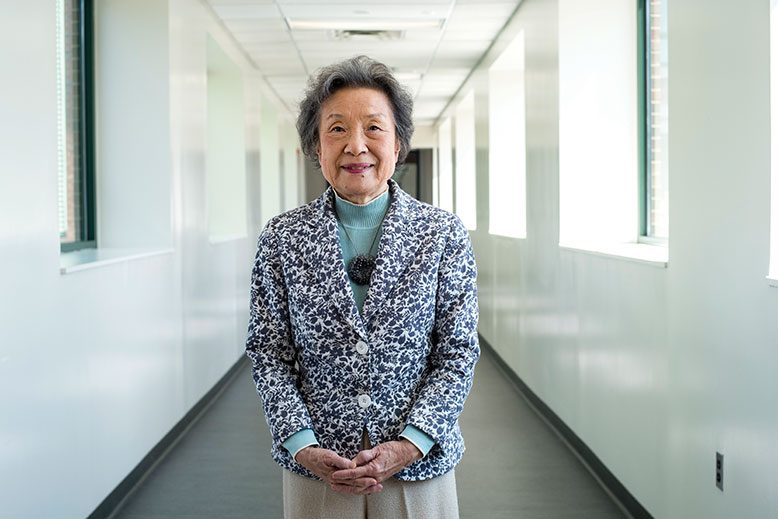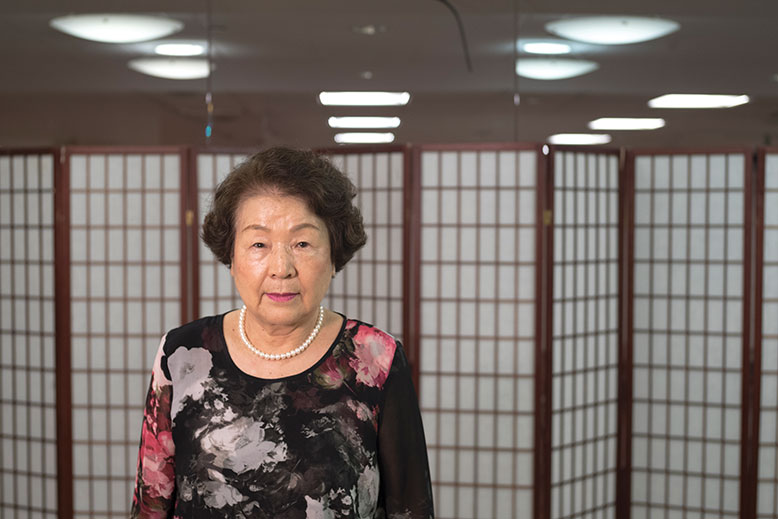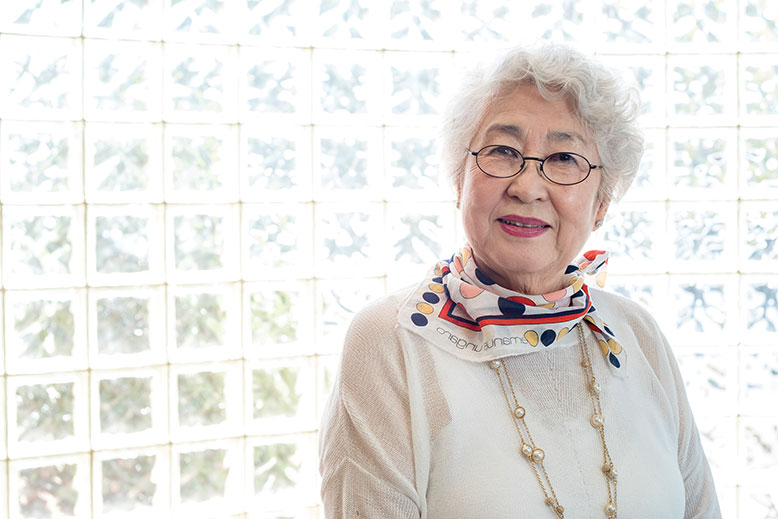
By 5:30 most mornings, Gui Ok Choi is standing outside the building where she lives, Highland View Apartments in Palisades Park, waiting for the bus that will take her to the fitness center in Fort Lee. She likes to be there when the pool opens at six. She swims for 30 minutes and takes the bus back.
“I had some arthritis problems in my knees and I couldn’t do exercises, so the doctor recommended swimming to avoid the impact on my knees,” she says through a translator as she waits for lunch in the senior activity center run by Bergen County’s Division of Senior Services on the first floor of her apartment building.

“I think it’s the New Jersey weather. The air is very nice here.” — Younghee Kim, 81. Photo by Ed Kashi/VII
That advice came 20 years ago. Choi is 88 now, and when she arrived at the center after her morning swim, she joined several dozen other women for the weekly osteoporosis exercise class. As the women sat in chairs moving their bodies in time with the instructor, the smaller number of men who frequent the center sat at a table near the door reading Korean newspapers and playing Go.
Choi and her husband came to the United States in 1984, following two of their five children who were already here. “Only the youngest is in Korea now,” she says. “Everybody else is here.”
She lives alone—her husband died in 2004—but her son lives nearby, also in Palisades Park, where the population is more than half Korean, the highest concentration of Koreans of any municipality in the nation, according to the American Community Survey by the U.S. Census Bureau. The signs on many of the storefronts along Broad Avenue are written in Hangul, the Korean alphabet. Kimchi, the spicy fermented cabbage that is a Korean staple, is as easy to find as pizza. Choi doesn’t buy her kimchi, though. She worked as a chef for her first decade in America, and she still makes her own.
Ethnic clusters like this—stores, restaurants, churches and extended families all in close proximity—allow immigrants to ease into their new country without leaving behind the diets and customs of their old ones. “Here in Bergen County, if you don’t speak any English at all, you can still function well,” says Kyung-Hee Choi, vice president of the Asian Health Services program at Holy Name Medical Center in Teaneck. “All your life-support infrastructure is here.”
By maintaining those healthy diets and customs here, Asian-Americans have established a cluster of longevity that surprises researchers. “I didn’t know where Bergen County was at all until we found the results and had to look,” says Dr. Christopher Murray, who led the Harvard study and is now director of the Institute for Health Metrics and Evaluation at the University of Washington. “The question for which there’s no great answer is: Is there any genetic component? I think the consensus right now is probably not, but it’s early days in gene sequencing, and I wouldn’t be surprised if 5 or 10 years from now the answer is different.”
The explanation backed by the most evidence relates to how Asian-American women treat their bodies. “The most powerful predictors of life span by county, with all races combined, were the five main risk factors we could study at the local level: tobacco, obesity, physical activity, blood sugar and blood pressure—and Asian-Americans have a very good risk profile,” Murray says. “Asian-American women avoid smoking and tend to have a very low obesity rate. They have low blood sugar generally and higher rates of physical activity than other groups.”
Sitting next to Gui Ok Choi at the senior center is Anna Jung, 81, who also wakes before dawn to maintain her well-being. A widow for 20 years, she lives with her son and grandchildren in Palisades Park, and at five each morning, she steps out onto the balcony to exercise. “Even if it’s dark,” she says through a translator. “The air is good.”
After her exercise routine and breakfast, Jung walks 10 blocks to the senior center, where she often joins the afternoon line dancing. “My philosophy is: Breakfast, eat like a king. Lunch, eat enough for you to work. Dinner, eat enough so you don’t starve,” she says.
As the men drift away after lunch, two dozen women finish a salsa dance and then, in unison, deftly follow the leader’s direction (“Three cha-chas this way, and the fourth one you turn”) when the music switches to old-time rock ’n’ roll: “Kansas City.”
“They’re very disciplined, they’re very active, they don’t want to be hanging around gaining weight, they want to be productive,” says Paul Kim, the center’s director. “The elderly are well revered. They’ve got all the answers.”

“The mind is important, everything happy and peaceful and lovely.” — Jung Ae Kim, 81. Photo by Ed Kashi/VII
In Glen Rock, Hyukyung Kang, 85, starts her mornings with a long walk accompanying her 10-year-old granddaughter to school, as she has ever since kindergarten. “Thirty minutes to school, thirty minutes coming back,” she says. “That’s good exercise.”
Kang came to the United States from Korea in 1974 with her four children to join her husband, who had arrived two years earlier and owned a wig shop on 34th Street in Manhattan, near Macy’s. She worked at a Japanese bank in Manhattan. “As translator, not money counter,” she says. “I can speak Japanese.”
She has been a widow for 30 years and has long lived in the kind of multigenerational household that is common among Asian-Americans—with her son and daughter-in-law and their three children; the oldest two have grown and gone. “Four of us in the house now,” she says. “We are very happy.”
The house itself, where her bedroom is on the third floor, is part of her fitness regimen, too. “So I’m living every day going up and going down,” says Kang, whose grandmother lived to 92. “It’s a little exercise.”
Family brings many older Koreans to New Jersey, and family is what helps give them a sense of purpose, and an incentive to stay healthy. “This is also helping the longevity,” says Kyung-Hee Choi, who started the Korean Medical Program at Pascack Valley Hospital 15 years ago and then moved it to Holy Name, where the program now includes other Asian groups. “They’re playing an important role. They’re being useful to their family members. They’re all helping each other.”
Yonghee Kim, 81, lives alone in a senior apartment in Fort Lee, but spends almost half her time at her daughter’s house in Closter, where she rides an exercise bicycle, stays over on weekends (so they can attend church together) and often cooks dinner. “I go to help them,” she says. “When I make food I feel very happy. I like to cook and share it with everybody.”
Her husband, a dentist, died of stomach cancer in Korea when he was 52, and she was 50. “I had to raise three kids, so I had to be more positive and strong,” she says. When her youngest daughter’s husband’s job brought him to America in 1997, she joined them, living with them initially, caring for her two granddaughters. She has her own theory about the longevity cluster.
“I think it’s the New Jersey weather,” she says. “The air is very nice here.”
“Yes, very clear here,” agrees Jung Ae Kim, 81, who lives a few blocks away in another senior apartment in Fort Lee. She and her late husband came to America in 1977 with their three children after he retired from the Korean Navy. They owned a hardware store in the Bronx for 17 years. “I was the cashier, my husband was on the floor.”
Every morning, Kim joins 10 other residents in the lobby of her building where they exercise together to a video. “One man is Taiwanese, the rest Korean,” she says. At 1 pm each weekday, a bus arrives to take her to Peaceful Adult Day Care Center in Little Ferry, where she has lunch (“every day we eat kimchi” she says) and dinner.
“Lunch and talking—talk, talk, talk,” she says. “The mind is important—everything happy and peaceful and lovely.”
